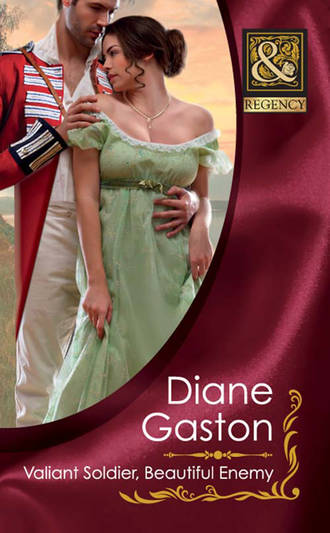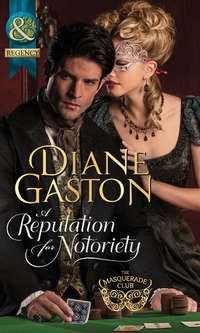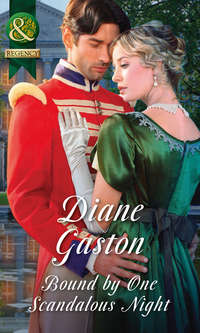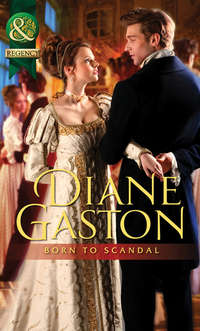
Полная версия
Valiant Soldier, Beautiful Enemy


âBonjour, Gabriel.â
Emmaline.
She looked even more beautiful than the image of her that inhabited his dreams at night. Her lace-lined bonnet of natural straw perfectly framed her flawless face. The dark blue of her walking dress made her eyes even more vibrant.
Good God. After two years she still had the power to affect him.
âWhy did you come to see me?â
Her lips trembled before she spoke. âOh, Gabriel. I need you.â
The hard earth heâd packed around his emotions began to crack.
She swallowed and went on, âI need your help.â
He came to his senses. âHelp with what?â
She met his eyes. âI need you to find Claude.â
âClaude.â The son whoâd driven a wedge between them.
About the Author
As a psychiatric social worker, DIANE GASTON spent years helping others create real-life happy endings. Now Diane crafts fictional ones, writing the kind of historical romance sheâs always loved to read. The youngest of three daughters of a US Army Colonel, Diane moved frequently during her childhood, even living for a year in Japan. It continues to amaze her that her own son and daughter grew up in one house in Northern Virginia. Diane still lives in that house, with her husband and three very ordinary housecats. Visit Dianeâs website at http://dianegaston.com
Previous novels by the same author:
THE MYSTERIOUS MISS M
THE WAGERING WIDOW A REPUTABLE RAKE INNOCENCE AND IMPROPRIETY A TWELFTH NIGHT TALE (in A Regency Christmas anthology) THE VANISHING VISCOUNTESS SCANDALISING THE TON JUSTINE AND THE NOBLE VISCOUNT (in Regency Summer Scandals) *GALLANT OFFICER, FORBIDDEN LADY *CHIVALROUS CAPTAIN, REBEL MISTRESS
*Three Soldiers mini-series
And in Mills & Boon® Historical Undone! eBooks:
THE UNLACING OF MISS LEIGH
Look for Claudeâs story THE LIBERATION OF MISS FINCH coming soon in Mills & Boon® Historical Undone! eBooks
Did you know that some of these novels are also available as eBooks? Visit www.millsandboon.co.uk
AUTHOR NOTE
Here is the final book in my Three Soldiers series, Valiant Soldier, Beautiful Enemy, Gabriel Deaneâs story. Unlike the heroes of Gallant Officer, Forbidden Lady and Chivalrous Captain, Rebel Mistress, Gabriel Deane was a career soldier, a man who believed the army was where he belonged. Like so many other men and women, both in history and in todayâs world, Gabriel gave up a normal conventional life for service to his country. He went where his government sent him and valiantly did what he was ordered to do, no matter how difficult or dangerous.
While the Three Soldiers series has focused on the effect of war on the soldier, specifically the effect of one horrific event, the theme of this book is how war affects everyone, the soldier and civilian alike. The more important message of all the books is that, in spite of war, love can still flourish and lead to happy endings.
That is my wish for all the soldiers
and their families in todayâs world: Love and a happy ending.
Look for Claudeâs story THE LIBERATION OF MISS FINCH coming soon in Mills & Boon® Historical Undone! eBooks
Valiant Soldier, Beautiful Enemy
Diane Gaston

www.millsandboon.co.uk
Dedication
In memory of my cousin,
Lt. Commander James H. Getman, who lost his life at age 31 while on active duty with the U.S. Coast Guard. And to all who lost their lives while serving their country. We are grateful.
Prologue
Badajoz, Spainâ1812
A womanâs scream pierced the night.
Countless screams had reached Captain Gabriel Deaneâs ears this night, amidst shattering glass, roaring flames and shouts of soldiers run amok. The siege of Badajoz had ended and the pillaging had begun.
The marauding soldiers were not the French, not the enemy known to live off the bounty of the vanquished. These were British soldiers, Gabeâs compatriots, prowling through the city like savage beasts, plundering, killing, raping. A false rumour saying Wellington would permit the plundering had sparked the violence.
Gabe and his lieutenant, Allan Landon, had been ordered into this cauldron, but not to stop the rioting. Their task was to find one man.
Edwin Tranville.
Edwinâs father, General Tranville, had ordered them to find his son, whoâd foolishly joined the marauders. Once inside the city Gabe and Landon had enough to do to save their own skins from drunken men in the throes of a bloodlust that refused to be slaked.
The scream sounded again, not distant like the other helpless cries of innocent women and childrenâthis womanâs cry was near.
They ran in the direction of the sound. A shot rang out and two soldiers dashed from an alley, almost colliding with them. Gabe and Landon turned into the alley and emerged in a courtyard illuminated by flames shooting from a burning building nearby.
A woman stood over a cowering figure wearing the uniform of a British Officer. She raised a knife and prepared to plunge its blade into the British officerâs back.
Gabe seized her from behind and wrenched the knife from her grasp. âOh, no, you donât, señora.â She was not in need of rescue after all.
âShe tried to kill me!â The British officer, covering his face with bloody hands, attempted to stand, but collapsed in a heap on the cobblestones.
At that moment another man stepped into the light. Lieutenant Landon swung around, pistol ready to fire.
âWait.â The man raised his hands. âI am Ensign Vernon of the East Essex.â He gestured to the unconscious officer. âHe was trying to kill the boy. And he attempted to rape the woman. I saw the whole thing. He and two others. The others ran.â
The two men who passed them? If so, it was too late to pursue them.
âThe boy?â Gabe glanced around. What boy? He saw only the woman and the red-coated officer she was about to kill. And nearby the body of a French soldier, pooled in blood.
Gabe kept a grip on the woman and used his foot to roll over her intended victim. The manâs face was gashed from temple to chin, but Gabe immediately recognised him.
He glanced up. âGood God, Landon, do you see who this is?â
Ensign Vernon answered instead. âEdwin Tranville.â His voice filled with disgust. âGeneral Tranvilleâs son.â
âEdwin Tranville,â Gabriel agreed. Theyâd found him after all.
âThe bloody bastard,â Landon spat.
Vernon nodded in agreement. âHe is drunk.â
When was Edwin not drunk? Gabe thought.
Another figure suddenly sprang from the shadows and Landon almost fired his pistol at him.
The ensign stopped him. âDo not shoot. It is the boy.â
A boy, not more than twelve years of age, flung himself atop the body of the French soldier.
âPapa!â the boy cried.
âNon, non, non, Claude.â The woman strained against Gabeâs grip. He released her and she ran to her son.
âGood God, they are French.â Not Spanish citizens of Badajoz. A French family trying to escape. What the devil had the Frenchman been thinking, putting his family in such danger? Gabe had no patience for men who took wives and children to war.
He knelt next to the body and placed his fingers on the manâs throat. âHeâs dead.â
The woman looked up at him. âMon mari.â Her husband.
Gabe drew in a sharp breath.
She was lovely. Even filled with great anguish, she was lovely. Hair as dark as a Spaniardâs, but with skin as fair as the very finest linen. Her eyes, their colour obscured in the dim light, were large and wide with emotion.
Gabeâs insides twisted in an anger that radiated clear to his fingertips. Had Edwin killed this man in front of his family? Had he tried to kill the boy and rape the woman, as the ensign said? What had the two other men done to her before it had been Edwinâs turn?
The boy cried, âPapa! Papa! Réveillez!â
âIl est mort, Claude.â Her tone, so low and soft, evoked a memory of Gabeâs own mother soothing one of his brothers or sisters.
Fists clenched, Gabe rose and strode back to Edwin, ready to kick him into a bloody pulp. He stopped himself.
Edwin rolled over again and curled into a ball, whimpering.
Gabe turned his gaze to Ensign Vernon and his voice trembled with anger. âDid Edwin kill him?â He pointed to the dead French soldier.
The ensign shook his head. âI did not see.â
âWhat will happen to her now?â Gabe spoke more to himself than to the others.
The woman pressed her son against her bosom, trying to comfort him, while shouts sounded nearby.
Gabe straightened. âWe must get them out of here.â He gestured to his lieutenant. âLandon, take Tranville back to camp. Ensign, Iâll need your help.â
âYou will not turn her in?â Landon looked aghast.
âOf course not,â he snapped. âIâm going to find her a safe place to stay. Maybe a church. Or somewhere.â He peered at Landon and at Ensign Vernon. âWe say nothing of this. Agreed?â
Landon glared at him and pointed to Edwin. âHe ought to hang for this.â
Gabe could not agree more, but over fifteen years in the army had taught him to be practical. He doubted any of the soldiers would face a hanging. Wellington needed them too much. General Tranville would certainly take no chances with his sonâs life and reputation. Gabe and Landon needed to protect themselves lest Tranville retaliate.
More importantly, Gabe needed to protect this woman.
âHe is the generalâs son.â His tone brooked no argument. âIf we report his crime, the general will have our necks, not Edwinâs.â He tilted his head towards the woman. âHe may even come after her and the boy.â The captain looked down at the now-insensible man who had caused all this grief. âThis bastard is so drunk he may not even know what he did. He wonât tell.â
âDrink is no excuseââ Landon began. He broke off and, after several seconds, nodded. âVery well. We say nothing.â
The captain turned to Vernon. âDo I have your word, Ensign?â
âYou do, sir,â the ensign readily agreed.
Glass shattered nearby and the roof of the burning building collapsed, sending sparks high into the air.
âWe must hurry.â Gabe paused only long enough to extend a handshake to the ensign. âI am Captain Deane. That is Lieutenant Landon.â He turned to the woman and her son. âIs there a church nearby?â His hand flew to his forehead. âDeuce. What is the French word for church?â He tapped his brow. âÃglise? Is that the word? Ãglise?â
âNon. No church, capitaine,â the woman replied. âMy ⦠my maisonâmy house. Come.â
âYou speak English, madame?â
âOui, un peuâa little.â
Landon threw Edwin over his shoulder.
âTake care,â Gabe said to him.
Landon gave a curt nod before trudging off in the direction they had come.
Gabe turned to the ensign. âI want you to come with me.â He looked over at the Frenchmanâs body. âWe will have to leave him here.â
âYes, sir.â
The woman gazed at her husband, her posture taut as if she felt pulled back to his side. Gabeâs heart bled for her. She put an arm around her son, who protested against leaving his father, and Gabe felt their struggle as if it were his own.
âCome,â she finally said, gesturing for them to follow her.
They made their way through the alley again and down a narrow street.
âMa maison,â she whispered, pointing to a wooden door that stood ajar.
Gabe signalled them to remain where they were. He entered the house.
Light from nearby fires illuminated the inside enough for him to see the contents of a home broken and strewn across the floor: legs from a chair, shards of crockery, scattered papers, items that had once formed the essence of everyday life. He searched the large room to be certain no one hid there. He continued into a small kitchen and a bedroom, both thoroughly ransacked.
He walked back to the front door. âNo one is here.â
The ensign escorted the mother and son through the doorway. The womanâs hand flew to cover her mouth as her eyes darted over the shambles of what had once been her life. Her son buried his face into her side. She held him close as she picked her way through the rubble towards the kitchen.
Determined to make her as comfortable as possible, Gabe strode into the bedroom and pulled the remains of the mattress into the large room, clearing a space for it in the corner. He found a blanket, half-shredded, and carried it to the mattress.
The woman emerged from the kitchen and handed him water in a chipped cup. The boy gripped her skirt, like a younger, frightened child.
He smiled his thanks. As he took the cup, his fingertips grazed her hand and his senses flared at the contact. He gulped down the water and handed her back the cup. âTheâthe Anglais, did they hurt you?â What was the French word? âViolate? Moleste?â
Her long graceful fingers gripped the cup. âNon. Ils mâont pas molester.â
He nodded, understanding her meaning. She had not been raped. Thank God.
âCan you keep watch?â he asked Ensign Vernon. âIâll sleep for an hour or so and relieve you.â Heâd not slept since the siege began, over twenty-four hours before.
âYes, sir,â the ensign replied.
They blocked the door with a barricade of broken furniture. The ensign found the remnants of a wooden chair with the seat and legs intact. He placed it at the window to keep watch.
The mother and child curled up together on the mattress. Gabe slid to the floor, his back against the wall. He glanced over at her and her gaze met his for one long moment as intense as an embrace.
Gabe was shaken by her effect on him. It did him no credit to be so attracted to her, not with the terror sheâd just been through.
Perhaps he was merely moved by her devotion to her child, how she held him, how she gazed upon him. Gabe had often watched his own mother tend as lovingly to his little sisters.
Or maybe her devotion to her son touched some deep yearning within him. The girls had come one after the other after Gabe was born, and he had often been left in the company of his older brothers, struggling to keep up.
What the devil was he musing about? He never needed to be the fussed over like his sisters. Much better to be toughened by the rough-housing of boys.
Gabe forced himself to close his eyes. He needed sleep. After sleeping an hour or two, heâd be thinking like a soldier again.
The sounds of looting and pillaging continued, but it was the womanâs voice, softly murmuring comfort to her son, that finally lulled Gabe to sleep.
The carnage lasted two more days. Gabe, Ensign Vernon and the mother and son remained in the relative safety of her ransacked home, even though the forced inactivity strained Gabeâs nerves. Heâd have preferred fighting his way through the town to this idleness.
His needs were inconsequential, however. The woman and child must be safeguarded.
What little food they could salvage went to the boy, who was hungry all the time. Ensign Vernon occupied the time by drawing. Some sketches he kept private. Some fanciful pictures of animals and such he gave to the boy in an attempt to amuse him. The boy merely stared at them blankly, spending most of his time at his motherâs side, watching Gabe and Vernon with eyes both angry and wary.
None of them spoke much. Gabe could count on his fingers how many words he and the woman spoke to each other. Still, she remained at the centre of his existence. There was no sound she made, no gesture or expression he did not notice, and the empty hours of waiting did not diminish his resolve to make certain she and her son reached safety.
On the third day it was clear order had been restored. Gabe led them out, and the woman only looked back once at what had been her home. Outside, the air smelled of smoke and burnt wood, but the only sound of soldiers was the rhythm of a disciplined march.
They walked to the cityâs centre where Gabe supposed the armyâs headquarters would be found. There Gabe was told to what building other French civilians had been taken. They found the correct building, but Gabe hesitated before taking the mother and son inside. It was difficult to leave her fate to strangers.
In an odd way he did not understand, she had become more important to him than anything else. Still, what choice did he have?
âWe should go in,â he told her.
Ensign Vernon said, âI will remain here, sir, if that is agreeable to you.â
âAs you wish,â Gabe replied.
âGoodbye, madame.â The ensign stepped away.
Looking frightened but resigned, she merely nodded.
Gabe escorted her and her son through the door to the end of a hallway where two soldiers stood guard. The room they guarded was bare of furniture except one table and a chair, on which a British officer sat. In the room were about twenty people, older men, once French officials perhaps, and other women and children whose families had been destroyed.
Gabe spoke to the British officer, explaining the womanâs circumstance to him.
âWhat happens to them?â he asked the man.
The officerâs answer was curt. âThe women and children will be sent back to France, if they have money for the passage.â
Gabe stepped away and fished in an inside pocket of his uniform, pulling out a purse full of coin, nearly all he possessed. Glancing around to make certain no one noticed, he pressed the purse into the womanâs hands. âYou will need this.â
Her eyes widened as her fingers closed around the small leather bag. âCapitaineââ
He pressed her hand. âNo argument. Noââ he pronounced it the French way ââargument.â
She closed her other hand around his and the power of her gaze tugged at something deep inside him. It was inexplicable, but saying goodbye felt like losing a part of himself.
He did not even know her name.
He pulled his hand from hers and pointed to himself. âGabriel Deane.â If she needed him, she would at least know his name.
âGabriel,â she whispered, speaking his name with the beauty of her French accent. âMerci. Que Dieu vous bénisse.â
His brows knit in confusion. Heâd forgotten most of the French heâd learned in school.
She struggled for words. âDieu ⦠God â¦â She crossed herself. âBénisse.â
âBless?â he guessed.
She nodded.
He forced himself to take a step back. âAu revoir, madame.â
Clenching his teeth, Gabe turned and started for the door before he did something foolish. Like kiss her. Or leave with her. She was a stranger, nothing more, important only in his fantasies. Not in reality.
âGabriel!â
He halted.
She ran to him.
She placed both hands on his cheeks and pulled his head down to kiss him on the lips. With her face still inches from his, she whispered, âMy name is Emmaline Mableau.â
He was afraid to speak for fear of betraying the swirling emotions inside him. An intense surge of longing enveloped him.
He desired her as a man desires a woman. It was foolish beyond everything. Dishonourable, as well, since sheâd just lost her husband to hands not unlike his own.
He met her gaze and held it a moment before fleeing out the door.
But his thoughts repeated, over and overâEmmaline Mableau.
Chapter One
Brussels, BelgiumâMay 1815
Emmaline Mableau!
Gabeâs heart pounded when he caught a glimpse of the woman from whom heâd parted three years before. Carrying a package, she walked briskly through the narrow Brussels streets. It was Emmaline Mableau, he was convinced.
Or very nearly convinced.
Heâd always imagined her back in France, living in some small village, with parents ⦠or a new husband.
But here she was, in Belgium.
Brussels had many French people, so it was certainly possible for her to reside here. Twenty years of French rule had only ended the year before when Napoleon was defeated.
Defeated for the first time, Gabe meant. LâEmpereur had escaped from his exile on Elba. Heâd raised an army and was now on the march to regain his empire. Gabeâs regiment, the Royal Scots, was part of Wellingtonâs Allied Army and would soon cross swords with Napoleonâs forces again.
Many of the English aristocracy had poured into Brussels after the treaty, fleeing the high prices in England, looking for elegant living at little cost. Even so, Brussels remained primed for French rule, as if the inhabitants expected Napoleon to walk its streets any day. Nearly everyone in the city spoke French. Shop signs were in French. The hotel where Gabe was billeted had a French name. Hôtel de Flandre.
Gabe had risen early to stretch his legs in the brisk morning air. He had few official duties at present, so spent his days exploring the city beyond the Parc de Brussels and the cathedral. Perhaps there was more of the cloth merchantâs son in him than heâd realised, because he liked best to walk the narrow streets lined with shops.
Heâd spied Emmaline Mableau as he descended the hill to reach that part of Brussels. Sheâd been rushing past shopkeepers who were just raising their shutters and opening their doors. Gabe bolted down the hill to follow her, getting only quick glimpses of her as he tried to catch up to her.
He might be mistaken about her being Emmaline Mableau. It might have been a mere trick of the eye and the fact that he often thought of her that made him believe the Belgian woman was she.
But he was determined to know for certain.
She turned a corner and he picked up his pace, fearing heâd lose sight of her. Near the end of the row of shops he glimpsed a flutter of skirts, a woman entering a doorway. His heart beat faster. That had to have been her. No one left on the street looked like her.
He slowed his pace as he approached where she had disappeared, carefully determining which store sheâd entered. The sign above the door read Magasin de Lacet. The shutters were open and pieces of lace draped over tables could be seen though the windows.








